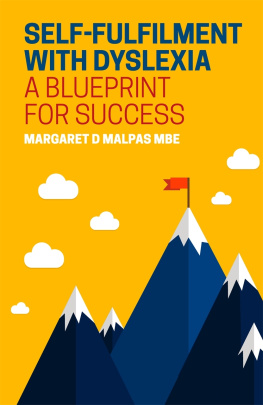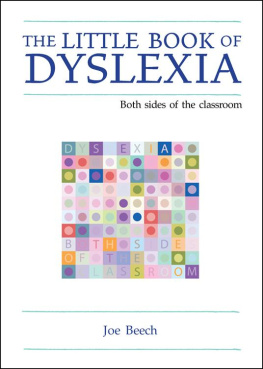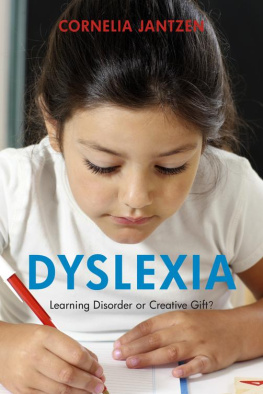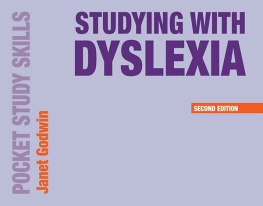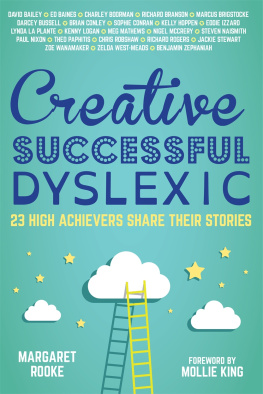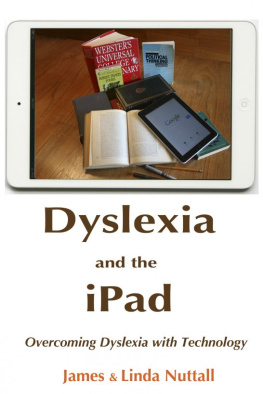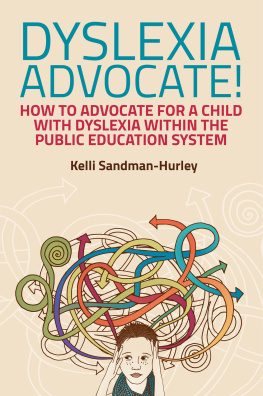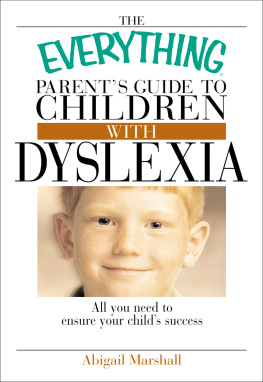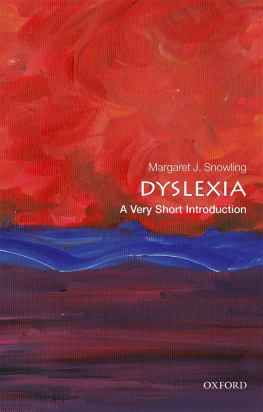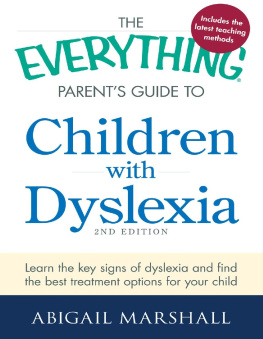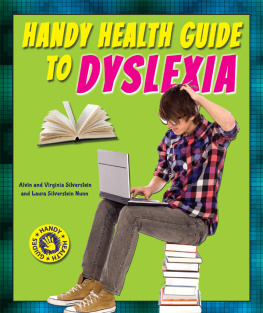
An inspiring and really practical book, well written by someone who clearly has the expertise and experience of working with many wonderful people with dyslexia. This book is for anyone wanting examples of how talent, perseverance and commitment can lead to great success.
Professor Amanda Kirby, Chair in Developmental
Disorders at University of South Wales and author of
How to Succeed in Employment with
Specific Learning Difficulties
This book contains fascinating information for people with dyslexia and anyone interested in helping them to achieve. Margaret Malpas makes it clear that high grades at school are not the only route to a fulfilling life, with detail on the significance of determination, rapport, listening skills and creativity. She even explains how procrastination can be useful. There are some truly inspiring nuggets in here to inspire and encourage, plus handy summaries for those not wanting to read it all at once.
Margaret Rooke, author of Creative,
Successful, Dyslexic: 23 High Achievers
Share Their Stories
This is an interesting and insightful book, which has been well-researched and includes relevant case studies to illustrate key traits for the successful dyslexic. My own struggle with undiagnosed dyslexia at school certainly made me more determined and this has played an integral role in my achievements and success.
Alais Winton, author of The Self-Help Guide
for Teens with Dyslexia and private
tutor for young dyslexics
of related interest
Creative, Successful, Dyslexic
23 High Achievers Share Their Stories
Margaret Rooke
Foreword by Mollie King
ISBN 978 1 84905 653 3
eISBN 978 1 78450 163 1
Dyslexia and Mental Health
Helping People Identify Destructive Behaviours and Find Positive Ways to Cope
Neil Alexander-Passe
Foreword by Michael Ryan and Pennie Aston
ISBN 978 1 84905 582 6
eISBN 978 1 78450 068 9
Dyslexia
How Would I Cope? Third Edition
Michael Ryden
ISBN 978 1 85302 385 9
eISBN 978 0 85700 055 2
The Self-Help Guide for Teens with Dyslexia
Useful Stuff You May Not Learn at School
Alais Winton
ISBN 978 1 84905 649 6
eISBN 978 1 78450 144 0
SELF-FULFILMENT
WITH DYSLEXIA
A BLUEPRINT
FOR SUCCESS
MARGARET D. MALPAS MBE

Jessica Kingsley Publishers
London and Philadelphia
First published in 2017
by Jessica Kingsley Publishers
73 Collier Street
London N1 9BE, UK
and
400 Market Street, Suite 400
Philadelphia, PA 19106, USA
www.jkp.com
Copyright Margaret D. Malpas 2017
All rights reserved. No part of this publication may be reproduced in any material form (including photocopying, storing in any medium by electronic means or transmitting) without the written permission of the copyright owner except in accordance with the provisions of the law or under terms of a licence issued in the UK by the Copyright Licensing Agency Ltd. www.cla.co.uk or in overseas territories by the relevant reproduction rights organisation, for details see www.ifrro.org. Applications for the copyright owners written permission to reproduce any part of this publication should be addressed to the publisher.
Warning: The doing of an unauthorised act in relation to a copyright work may result in both a civil claim for damages and criminal prosecution.
Library of Congress Cataloging in Publication Data
Title: Self-fulfilment with dyslexia : a blueprint for success / Margaret D. Malpas.
Description: London ; Philadelphia : Jessica Kingsley Publishers, 2017. |
Includes bibliographical references.
Identifiers: LCCN 2016048160 | ISBN 9781785921988 (alk. paper)
Subjects: LCSH: Dyslexia--Popular works. | Dyslexia--Case studies. |
Self-care, Health--Popular works.
Classification: LCC RC394.W6 M35 2017 | DDC 616.85/53--dc23 LC record available at https://lccn.loc.gov/2016048160
British Library Cataloguing in Publication Data
A CIP catalogue record for this book is available from the British Library
ISBN 978 1 78592 198 8
eISBN 978 1 78450 472 4
Contents
Preface
This is exciting! The research into many successful dyslexic people, and not just the high fliers, is showing us what we all need to do to be successful and self-fulfilled. So this book will give you the keys to successful behaviours and take you through how you can learn the skills that you need. You will also be able to read case study examples of individuals with dyslexia who are already drawing on and optimising their strengths. They are all very able individuals and their story could be yours!
Successful dyslexics in all fields
In all fields, there are incredibly successful people who ascribe much of their success to their dyslexia. We often quote, as examples, Richard Rogers, the architect, or Nigel Kennedy, the violinist, or Jackie Stewart, the racing car driver.
Dyslexic self-made millionaires
Research carried out by the B.B.C. in 2003 on 300 millionaires discovered that 40 per cent of these self-made millionaires were diagnosed with dyslexia and related learning difficulties. Cass Business School has done some research that indicates that 1830 per cent of entrepreneurs are dyslexic or have related conditions.
Overlap in dyslexia strengths and entrepreneurs
There is also a huge overlap in the competencies of an entrepreneur and dyslexic traits. However, whilst not all successful individuals are millionaires, many others may count their success in other than monetary terms.
Happiness is not in the mere possession of money; it lies in the joy of achievement, in the thrill of creative effort.
President Franklin D. Roosevelt
My research on ordinary people who are self-fulfilled
For my research, I looked at ordinary people who were dyslexic or counted themselves as being dyslexic after screening. I have also taken success to be either the ability of the individual to exist at the very least comfortably, or where the individual self-reports that they are or have been successful.
Using dyslexia as an umbrella for all related conditions
This book will give you the keys to successful behaviours and take you through how you can learn the skills that you need. Throughout, I have used the term dyslexia, as it is the most common of all the Specific Learning Difficulties (Sp.L.D.s), but these conditions all overlap and often coexist. It is very rare indeed to find someone who is purely dyslexic. Therefore, what is written here is largely applicable to all the other 7 conditions known to be related. If you want to learn more about dyslexia and these related conditions of Dyscalculia, Attention Deficit Hyperactivity Disorder (A.D.H.D.), Attention Deficit Disorder (A.D.D.), Aspergers Syndrome (Autism Level 1), Dyspraxia (D.C.D.), Dysgraphia, and Specific Speech and Language Impairment then there is more information for you in the Notes section, .
So, whats stopping us? Lets get going and learn all about what the characteristics of successful dyslexic people are and the research that shows us we can trust this view.
How the book came about
In 2015, I had been voluntarily working with the British Dyslexia Association for almost a decade. I had met thousands of dyslexic individuals during the course of my work. Many of these were super-successful in a particular area, others were quite successful but would have liked to be more effective in some areas, and some were really struggling both economically and with unresolved emotional trauma. I wanted to know what made the difference. There are so many of us with these conditions that it is unlikely that any government will ever really create the opportunities for all to succeed. This started me thinking about whether we could unlock the reasons why some people were successful either despite or because of what their dyslexic condition gave them to work with. So I started to examine the research on adults with dyslexia and other Sp.L.D.s.
Next page
